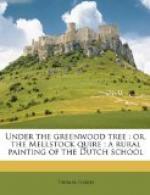Another pause ensued, varied only by the surging of the rain against the window-panes, and then Fancy spoke, in a faint and broken voice.
“Yes, I will,” she said.
“God bless you, my own!” He advanced quickly, and put his arm out to embrace her. She drew back hastily. “No no, not now!” she said in an agitated whisper. “There are things;—but the temptation is, O, too strong, and I can’t resist it; I can’t tell you now, but I must tell you! Don’t, please, don’t come near me now! I want to think, I can scarcely get myself used to the idea of what I have promised yet.” The next minute she turned to a desk, buried her face in her hands, and burst into a hysterical fit of weeping. “O, leave me to myself!” she sobbed; “leave me! O, leave me!”
“Don’t be distressed; don’t, dearest!” It was with visible difficulty that he restrained himself from approaching her. “You shall tell me at your leisure what it is that grieves you so; I am happy—beyond all measure happy!—at having your simple promise.”
“And do go and leave me now!”
“But I must not, in justice to you, leave for a minute, until you are yourself again.”
“There then,” she said, controlling her emotion, and standing up; “I am not disturbed now.”
He reluctantly moved towards the door. “Good-bye!” he murmured tenderly. “I’ll come to-morrow about this time.”
CHAPTER VII: SECOND THOUGHTS
The next morning the vicar rose early. The first thing he did was to write a long and careful letter to his friend in Yorkshire. Then, eating a little breakfast, he crossed the meadows in the direction of Casterbridge, bearing his letter in his pocket, that he might post it at the town office, and obviate the loss of one day in its transmission that would have resulted had he left it for the foot-post through the village.
It was a foggy morning, and the trees shed in noisy water-drops the moisture they had collected from the thick air, an acorn occasionally falling from its cup to the ground, in company with the drippings. In the meads, sheets of spiders’-web, almost opaque with wet, hung in folds over the fences, and the falling leaves appeared in every variety of brown, green, and yellow hue.
A low and merry whistling was heard on the highway he was approaching, then the light footsteps of a man going in the same direction as himself. On reaching the junction of his path with the road, the vicar beheld Dick Dewy’s open and cheerful face. Dick lifted his hat, and the vicar came out into the highway that Dick was pursuing.
“Good-morning, Dewy. How well you are looking!” said Mr. Maybold.
“Yes, sir, I am well—quite well! I am going to Casterbridge now, to get Smart’s collar; we left it there Saturday to be repaired.”
“I am going to Casterbridge, so we’ll walk together,” the vicar said. Dick gave a hop with one foot to put himself in step with Mr. Maybold, who proceeded: “I fancy I didn’t see you at church yesterday, Dewy. Or were you behind the pier?”




